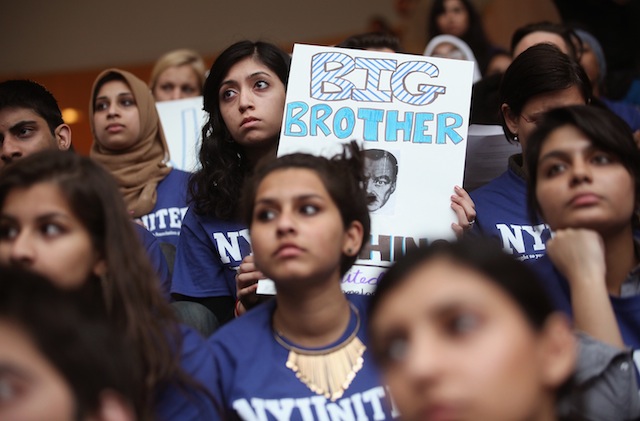In late February, U.S. District Judge William J. Martini found that the New York Police Department hadn’t violated the rights of the New Jersey-based plaintiffs in Hassan v. City of New York, a class action suit filed in response to the NYPD’s [massive spying](https://colorlines.com/archives/2012/02/first_came_the_shock_then.html) on Muslim mosques, businessness and student associations in the name of finding terrorists.
"The policy could not have monitored New Jersey for Muslim terrorist activities without monitoring the Muslim community itself," Judge Martini wrote in a his decision dismissing the case. "The motive for the program was not to soley discriminate against Muslims, but rather to find Muslim terrorists hiding among ordinary, law-abiding Muslims."
Attorneys in the suit, which was originaly filed on June 6, 2012 by Muslim Advocates and now has the Center for Constitutional Rights (CCR) as co-counsel, are appealing. Colorlines caught up with Omar Farah, a staff attorney at the CCR who is actively involved the case, to discuss the status of the appeal and the precedent it will set for Americans of all backgrounds. Below is an edited and condensed version of the converstation.
Where are you with Hassan v. New York City?
The District Court of New Jersey dismissed our petition and we’ve filed a notice of appeals. … We will be submitting the opening brief of the appeal on May 20, and now we’re really gearing up. What’s really great is that the plaintiffs are absolutely steadfast in their support and determined to continue fighting the case. They are continuing to show their resolve. It’s a very difficult thing to stand up against the most powerful police department in the country and say, "What you’re doing to me is wrong." It’s even harder to do that against such a harsh decision by the district court to dismiss, sending a message that you endured nothing wrong. The plaintiffs have been really inspiring.
Where have you been seeing a positive response to the case?
There has been a lot of support among the Muslim community at large. There’s been a real outpouring of support, especially from the Rutgers [University] student body, which directly experienced this surveillance. The Muslim community is standing up and saying, "Enough is enough. We don’t want to be presumed to be a threat. We will not be policed and monitored in this way." It’s important for us to continue to reach out and make more ties, and give the community the support it needs.
Will the outcome of the case only affect Muslim Americans?
This is the problem with these kinds of decisions: As much as this particular opinion from the district court was written about Muslims and carves out an exception to basic protections against Muslims, it can easily be applied to any other group that finds itself in a disfavorable position. All Americans–regardless of affiliation–need to be very, very concerned with this opinion. It chips away at bedrock principles that Americans need to be worried about. While it’s a reflection of the current political climate, the outcry hasn’t been quite as pitched as we’d like. This is something that impacts all Americans.
Why do you think there hasn’t been much of a response from other communities?
To the extent there has been a lack of response from other communities and some within the Muslim community, that is a likely a reflection of the difficult political climate that exists now that disfavors Muslims. It is a very natural response from outspoken members of the Muslim community to attempt to reinforce the truth that Muslims Americans are no different from any other Americans. That is what the arguments in our case are about.
What will be the lasting impact of this case?
You can’t underestimate how damaging [Judge Martini’s dismissal] is. The implication is clear. It tells us that certain groups in certain cases are an exception to constitutional norms. It says that there is no way of monitoring terrorism without monitoring the Muslim community–that it is the source of the threat. These messages are antithetical to basic constitutional norms. It’s an important case to watch. It’s also important to keep an eye on the Raza v. City of New York case, which addresses the same issue, but within New York and not New Jersey. These cases are the first challenges to the NYPD surveillance program. It will be very interesting to see what comes of this.
